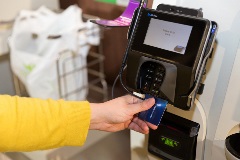By: Hannah Walker, Vice President, Political Affairs, FMI
 This past summer, the Federal Reserve Board (FRB) made an announcement that didn’t quite garner the attention it did when announcing rate reductions, but it was still exciting for food retailers nonetheless! On August 5, the Federal Reserve announced that it's moving forward with building a real-time gross settlement service (RTGS) called “FedNow.” The announcement was strongly supported by FMI and many other stakeholders in the payments ecosystem. As I previously blogged, RTGS will settle transactions instantly in order to eliminate the sometimes days it takes for funds to be transferred between banks and into customers' accounts.
This past summer, the Federal Reserve Board (FRB) made an announcement that didn’t quite garner the attention it did when announcing rate reductions, but it was still exciting for food retailers nonetheless! On August 5, the Federal Reserve announced that it's moving forward with building a real-time gross settlement service (RTGS) called “FedNow.” The announcement was strongly supported by FMI and many other stakeholders in the payments ecosystem. As I previously blogged, RTGS will settle transactions instantly in order to eliminate the sometimes days it takes for funds to be transferred between banks and into customers' accounts.
When the FRB announced its plans to launch “FedNow,” they specifically commented on the need for competition and for multiple players to be in the payment space. The FRB sought input from stakeholders on a proposal to stand up a RTGS here in the U.S. FMI submitted comments strongly supporting the proposal and encouraged the FRB to move forward quickly to help the U.S. continue to compete in the global market.
Following this summer’s announcement, FMI once again submitted comments to the FRB on “FedNow,” and how we would like to see it function, be governed and its future capabilities, particularly around end-user experience and the open and inclusive governance with all stakeholders.
Ease of use for the end-user is essential
End-user adoption will determine the success of FedNow. If there is a lack of uniformity in the user experience, or large hurdles for the customer to utilize FedNow, it will result in a lack of adoption.
Our comments focused on the unique perspective of end-users of the system and how we would like to see it governed in an open and inclusive manner ensuring that all stakeholders cannot just be heard but affect outcomes.
Fostering both innovation and competition in the payment space
The U.S. payments system has traditionally taken a top-down approach with products, standards and protocols all being centrally set by a closed group without the ability of all stakeholders to participate and drive the outcome. Additionally, we shared thoughts on how the service can be accessed and the importance of fostering both innovation and competition in this space.
Now the real work begins. FMI will remain engaged to ensure that the system is built securely, with equitable access, and as quickly as possible.
If you have any questions, please contact Hannah Walker.
 Industry Topics address your specific area of expertise with resources, reports, events and more.
Industry Topics address your specific area of expertise with resources, reports, events and more.
 Our Research covers consumer behavior and retail operation benchmarks so you can make informed business decisions.
Our Research covers consumer behavior and retail operation benchmarks so you can make informed business decisions.
 Events and Education including online and in-person help you advance your food retail career.
Events and Education including online and in-person help you advance your food retail career.
 Food Safety training, resources and guidance that help you create a company food safety culture.
Food Safety training, resources and guidance that help you create a company food safety culture.
 Government Affairs work — federal and state — on the latest food industry policy, regulatory and legislative issues.
Government Affairs work — federal and state — on the latest food industry policy, regulatory and legislative issues.
 Get Involved. From industry awards to newsletters and committees, these resources help you take advantage of your membership.
Get Involved. From industry awards to newsletters and committees, these resources help you take advantage of your membership.
 Best practices, guidance documents, infographics, signage and more for the food industry on the COVID-19 pandemic.
Best practices, guidance documents, infographics, signage and more for the food industry on the COVID-19 pandemic.
